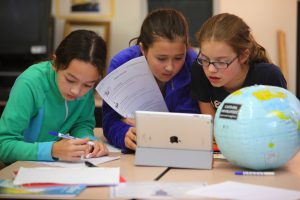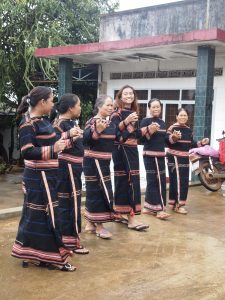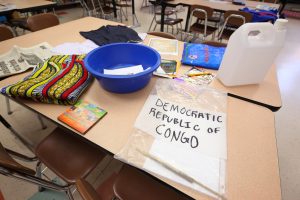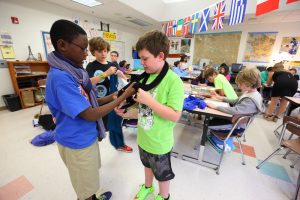Carolina Navigators: Connecting K-14 Students to a Global Education
February 28, 2020Carolina Passport, UNC Global Affairs

Students use technology to complete a worksheet on the items within their French culture kit.
The Montagnards, an ethnic minority in the central highlands of Vietnam, grapple with a history largely erased by colonialism. Having had little-to-no representation in their native Vietnam, both collective and individual Montagnard identities suffer. Since Montagnard culture remains largely underrepresented in Vietnam, it seemed unlikely that knowledge about this ethnic minority would reach Americans. This was H’Abigail Mlo ’20’s belief about her identity as a Montagnard, until she created a culture kit for Carolina Navigators as a Center for Global Initiatives (CGI) Awardee.
Now, students in K-14 classrooms, which includes community colleges, all over North Carolina have the opportunity to learn about Montagnards — to wrap weaved bracelets made by Montagnard artisans around their wrists, to explore the dimensions of a rice pouch from the highlands of Vietnam, and ultimately, to understand and celebrate a culture in a way that Montagnard students like Mlo could have never imagined growing up.
The culture kit was born of out a project Mlo started alongside two other Carolina students with Montagnard heritage, Ly Nuin ‘19 and Phun H ‘20, to document elements of Montagnard culture in an effort to preserve it for the diaspora community in North Carolina. With approximately 20,000 Montagnard diaspora community members in the state, North Carolina has the largest Montagnard population outside of Southeast Asia.

“One of the main reasons Ly, Phun, and I applied for the grant through the Center for Global Initiatives and started this project was the underrepresentation we felt growing up,” she said. “Our stories weren’t told, and our histories weren’t taught in schools, so it was easy to grow up not appreciating our heritage. The culture kit… [is] a means for Montagnards to feel connected to their heritage and to realize that Montagnard stories are valid and important.”
These culture kits are only one of many initiatives led by Carolina Navigators, a program within CGI that provides free global education resources to North Carolina classrooms while also creating global engagement opportunities for Carolina students. Students at UNC-Chapel Hill are able to work with Carolina Navigators in multiple capacities: as service-learning students, interns, or CGI awardees, who are encouraged to create culture kits reflective of the culture and community in which they were immersed.
Students pursuing service-learning experiences with Navigators focus their work on one of three different tracks: a culture kit track; a multimedia track; or Zoom, a virtual presentation track.
Culture kits, like the one created by Mlo and her collaborators, hold special meaning for Carolina Navigators. They are created by UNC-Chapel Hill students who have traveled abroad, live abroad, or come from multicultural families, and therefore hold personal meaning as well as instructional value. Elizabeth Bucrek, program manager and instructor for Carolina Navigators, believes that student input in the culture kits is key to their value.
“The students are the experts, and they are the ones writing the descriptions of each item,” she explained. “They have expertise on these countries through personal experience, which allows them to bring their voices to [the kits]. We believe it is important for Carolina students to share their stories.”

a jerrycan, mosquito net, Congolese newspaper, a wash basin for clothes, a boy’s school uniform, a music video, a DRC flag, and cloth from a market in the capital city of Kinshasa.
After the kits are created, K–14 educators from around the state are able to reserve them and have the kits shipped directly to their classrooms. Around sixty to seventy-five percent of Carolina Navigators’ culture kits go to Title I schools, which educate large concentrations of low-income students. The tangibility of the culture kits inspires educators and students of all backgrounds to seek more global experiences. Bringing those experiences to local communities is a crucial part of CGI’s pan-university initiative to open access to global opportunities that transcend financial, cultural, and institutional barriers.
Bucrek also sees the culture kits as a tool to help students move past dangerous cultural stereotypes. The first item on Bucrek’s syllabus for her service-learning students is to watch author Chimamanda Ngozi Adichie’s TED talk, “The Danger of a Single Story,” and consider the limitations of relying on singular narratives about entire nations or cultures that can perpetuate stereotypes and leave little room for nuance.
“You can’t fit a whole country into a bag,” Bucrek said. “We try to include more complex items than what people expect.”
Beyond culture kits, Carolina Navigators has also created a variety of virtual resources for educators to share in classrooms. They operate a YouTube channel, where UNC-Chapel Hill students can share their intercultural experiences and host a semi-annual virtual cultural festival. This festival has historically drawn participation from up to a hundred different classrooms and involved up to two thousand students from North Carolina schools.
Alexis Strang ’17, MA ’19, a graduate student in the TransAtlantic Masters Program at Carolina, says that she valued the time she spent with Carolina Navigators as an undergraduate service-learning student, intern, and CGI awardee. She contributed to the virtual cultural festival, giving a presentation about animals from different countries. “I remember just looking at the screen and seeing all these kids just jumping around, raising their hands and asking questions,” she said. “That is the image that stands out — just how excited the kids were to do something different and talk to people outside of their own classroom.”

As it stands, demand for culture kits is increasing yearly, and attendance at Carolina Navigators’ virtual cultural festivals is rising. With this success, Carolina Navigators continues to be an initiative at the forefront of open-access global education, utilizing both in-person and online resources to spark desire for cross-cultural understanding throughout North Carolina. During the 2018-2019 academic year, 52 Carolina students participated in the Navigators program to have an impact on 89,132 K-12 students and 3,379 educators from 271 different schools in 59 counties.
While this may be the most obvious measure of their impact, Carolina Navigators’ work has an important effect on Carolina students as well. After their experiences with Navigators, both Mlo and Strang are considering global education as a career path.
“My experience with Navigators made me reflect on how insular our education system can be,” Strang says. “It showed me how important it is to bring these ideas to people; how it makes people more sympathetic and understanding and curious.”
The work of Carolina Navigators in developing intercultural knowledge and understanding is ongoing. Currently, they are focusing efforts on securing more funding as demand for culture kits increases.
Demonstrating an intention to deepen local connections, Carolina Navigators are also developing a new partnership with Teachers 2 Teachers International and Chatham County schools, in which they will help teachers plan lessons around culture kits. Carolina Navigators works with CGI to bridge the local and the global, and their strategies for doing so continue to deepen and diversify with each passing year.
This story originally appeared in the 2020 issue of Carolina Passport magazine.
